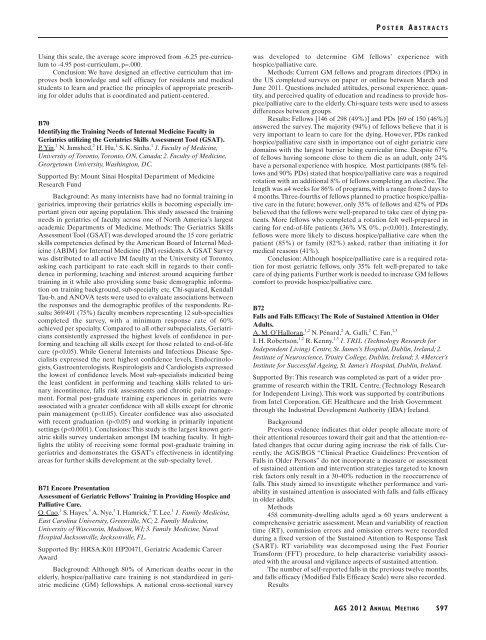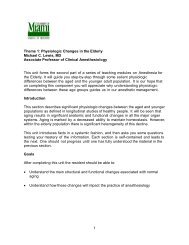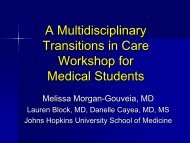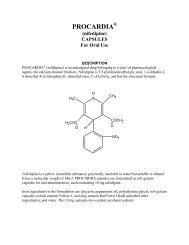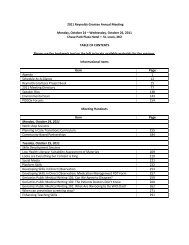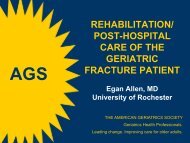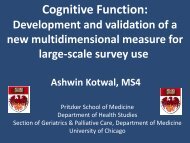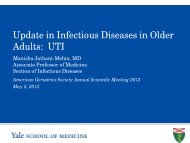Here - American Geriatrics Society
Here - American Geriatrics Society
Here - American Geriatrics Society
You also want an ePaper? Increase the reach of your titles
YUMPU automatically turns print PDFs into web optimized ePapers that Google loves.
P OSTER<br />
A BSTRACTS<br />
Using this scale, the average score improved from -6.25 pre-curriculum<br />
to -4.95 post-curriculum, p=.000.<br />
Conclusion: We have designed an effective curriculum that improves<br />
both knowledge and self efficacy for residents and medical<br />
students to learn and practice the principles of appropriate prescribing<br />
for older adults that is coordinated and patient-centered.<br />
B70<br />
Identifying the Training Needs of Internal Medicine Faculty in<br />
<strong>Geriatrics</strong> utilizing the <strong>Geriatrics</strong> Skills Assessment Tool (GSAT).<br />
P. Yin, 1 N. Jamshed, 2 H. Hu, 1 S. K. Sinha. 1 1. Faculty of Medicine,<br />
University of Toronto, Toronto, ON, Canada; 2. Faculty of Medicine,<br />
Georgetown University, Washington, DC.<br />
Supported By: Mount Sinai Hospital Department of Medicine<br />
Research Fund<br />
Background: As many internists have had no formal training in<br />
geriatrics, improving their geriatrics skills is becoming especially important<br />
given our ageing population. This study assessed the training<br />
needs in geriatrics of faculty across one of North America’s largest<br />
academic Departments of Medicine. Methods: The <strong>Geriatrics</strong> Skills<br />
Assessment Tool (GSAT) was developed around the 15 core geriatric<br />
skills competencies defined by the <strong>American</strong> Board of Internal Medicine<br />
(ABIM) for Internal Medicine (IM) residents. A GSAT Survey<br />
was distributed to all active IM faculty at the University of Toronto,<br />
asking each participant to rate each skill in regards to their confidence<br />
in performing, teaching and interest around acquiring further<br />
training in it while also providing some basic demographic information<br />
on training background, sub-specialty etc. Chi-squared, Kendall<br />
Tau-b, and ANOVA tests were used to evaluate associations between<br />
the responses and the demographic profiles of the respondents. Results:<br />
369/491 (75%) faculty members representing 12 sub-specialties<br />
completed the survey, with a minimum response rate of 60%<br />
achieved per specialty. Compared to all other subspecialists, Geriatricians<br />
consistently expressed the highest levels of confidence in performing<br />
and teaching all skills except for those related to end-of-life<br />
care (p


